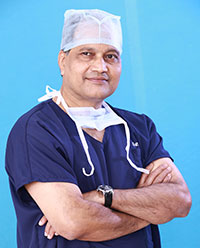The department deals with a range of surgical treatment with various ailments. In addition to treating minor conditions, disorders and swellings, the surgeons are adept at handling complex abdominal surgeries and trauma cases. Most abdominal surgeries are performed through Laparoscopy (Keyhole surgery). The hospital is equipped with state-of-the-art operation theatres and Intensive Care Units fitted with the latest technology to support our team of highly skilled surgeons, trained nurses and technicians.
Our Services:
- Emergency Exploratory Laparotomy for Polytrauma
- Inguinal, Incision and Ventral Hernia Repairs
- Surgeries of the Liver and Gallbladder
- Esophageal Resections and Reconstruction
- Gastric (Stomach) Surgery – Gastrectomy, Gastrojejunostomy & Vagotomy
- Surgeries of the Small and Large Intestine
- Splenectomy (Spleen Removal)
- Colorectal Surgery
- Pancreatic Surgery
- Whipple’s Surgery
- Pancreatic Bypass Surgery
- Pancreaticojejunostomy
- Distal Pancreatectomy
- Minimally Invasive Surgeries for Varicose Veins of the Lower Limb
- Wound Care for Diabetic Foot and Venous Ulcers
- Breast Surgeries – Simple Mastectomy, Modified Radical Mastectomy & Lumpectomy
- Surgery for Piles, Fissure and Fistula
List of Laparoscopic Surgeries Done:
Minimally invasive (or key-hole) surgery is a safe and effective treatment option for conditions requiring surgical intervention. Over the years, the procedure has emerged as the preferred alternative to traditional surgery (open surgery), which involves larger incisions and longer hospital stay. The use of minimally invasive (laparoscopic) surgery has widely expanded to include several surgical specialities since then.
Surgeries performed laparoscopically at Medica Siliguri include:
Cholecystectomy
Cholecystectomy is gallbladder removal surgery) done with the help of special surgical tools inserted through tiny incisions in the abdomen. A small camera allows the surgeon to get a clear look inside the abdomen. The procedure ensures minimal risk of complications, shorter hospital stay and faster recovery.
Your doctor may recommend a cholecystectomy if you have:
- Gallbladder inflammation (cholecystitis)
- Gallstones in the bile duct (choledocholithiasis)
- Gallstones in the gallbladder (cholelithiasis)
- Inflammation in the pancreas due to gallstones (pancreatitis)
- Large gallbladder polyps
Diagnostic Laparoscopy
Diagnostic Laparoscopy is a minimally invasive procedure that helps in diagnosing intra abdominal diseases. The surgeon is able to view the organs in the abdomen area through a camera to look for abnormalities. A small tube called cannula is inserted through a small incision below the belly button of the patient. Carbon dioxide gas is then used to inflate the abdomen, which helps the surgeon to see the organs clearly. The method is also used for tissue biopsy, culture acquisition and several therapeutic procedures.
Appendectomy
Appendectomy is an emergency surgery commonly performed to treat appendicitis, an inflammatory condition of the appendix. The appendix is a small pouch-like organ attached to the large intestine, located in the lower right side of the abdomen. A blockage formed in the lining of the appendix can lead to an infection, which is the likely cause of appendicitis. The pain intensifies and becomes severe as inflammation worsens. Leaving the condition untreated for long increases risk of bursting of appendix which can be life threatening. Lap appendectomy is a minimally invasive procedure where the infected appendix is removed through a small hole in the lower abdomen. It is a scarless procedure with very little recovery time.
Inguinal Hernia Repair
An inguinal hernia results from protruding soft tissues or defects in the lower abdominal muscles. This usually occurs in the groin and surrounding region.
Laparoscopy is a recommended procedure when the hernia is not very large and easy to access. Contrary to open surgery, this procedure involves using a laparoscope to remove the hernia that leaves behind minor scars and speeds up the recovery time.
Surgery is typically recommended if:
- The hernia has grown bigger
- Pain increases and becomes unbearable
- You are unable to carry on with routine activities
Incisional and Ventral Hernia Repair
An incisional or ventral hernia is one that occurs right in the middle of the abdomen at the site of a previous surgical incision. Surgery to repair this type of hernia is recommended if the patient experiences pain, discomfort and disfiguring (cosmesis).
Splenectomy
Splenectomy is performed laparoscopically by inserting an elongated tool through a few incisions in the abdomen to locate the spleen. Carbon dioxide passed through one of the incisions in the abdomen pushes the nearby organs aside and allows the surgeon to operate the spleen. It is then disconnected from the surrounding structures and removed. Finally, the procedure is completed by stitching the surgical openings.






